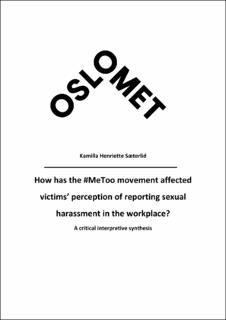| dc.description.abstract | Aim: The aim of this thesis is to explore facilitators and barriers of victims’ perception of reporting sexual harassment in the workplace and their perception of organizational complaint mechanisms. The thesis also aims to explore the relation between a victim’s perception of reporting and organizational complaint mechanisms, and the #MeToo movement.
Methodology: This thesis applies the critical interpretive synthesis approach and attempts to interpret and arrange recurring concepts to develop theory, referred to in this thesis as a synthesizing argument, in order to both shed light on the sociohistorical processes and to generate new ways of understanding.
Results: An analysis of the literature identified two main recurring concepts relevant for the compass question, organizational culture and the law. To demonstrate their importance, facilitators and barriers that control victims’ perception of reporting sexual harassment incidents as well as organizational complaint mechanisms within the two concepts were identified. Through mapping out these facilitators and barriers, a pattern started emerging that became the base of the synthesizing argument and the theoretical model.
Synthesizing argument: The synthesizing argument states that although the #MeToo movement has highlighted the inadequacy and inefficiency of official reports as an organizational complaint mechanism, organizations have responded to the movement by pointing to their existing policies and complaint mechanisms. For while public opinionmay have changed, the #MeToo movement has not succeeded in influencing major policy change in the areas needed to challenge victims’ perception of reporting and organizational complaint mechanisms. To substantiate the synthesizing argument, this thesis will draw parallels between the theory emerging from the literature and several existing theories: The Advocacy Coalition Framework (Jenkins-Smith et al., 2018); Piven and Clowards theory on the impact of social movements (Piven & Cloward, 1979); and Weick’s theory on sensemaking(Weick, 1995). | en_US |
